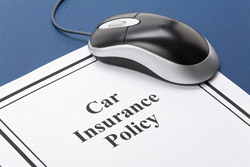
How to Insure your Subaru Forester on a Budget
If shopping your car insurance around was fun, we'd do it much more often. But the reality is, you probably don't enjoy it and you think it costs too much. Cutting the check for each renewal on your Subaru Forester might give you the same feeling.
Step One: Insurance Rate Comparison Quotes
The old way of buying car insurance was to make multiple trips to various local agents and get strong armed into a policy that didn't necessarily fit you. Not anymore!
Getting online rate quotes for a Subaru Forester from all the major insurance companies is very easy and only requires you to enter your information once.
To compare rates now, have your current policy handy (if you have one) and click the link below. Complete the short form and move on to step two.
Read this (it's important)! When doing any car insurance quote to compare rates to either your existing policy or to other quotes, it's important to use identical coverages on all quotes. Otherwise you will not be able to accurately determine which company has the lowest rate for your Forester.
Step Two: Insider Tips for Finding Cheaper Forester Insurance
There are many contributing factors that determine what you pay to insure your Subaru. You can help yourself (and your wallet) by paying attention to the following rate factors.

- Vehicles that tend to get stolen or have high repair costs will cost you more to insure. If your Forester falls into either category, it could cost you.
- Insurance companies often give discounts to senior citizens and professional organizations, so if you're one of those, check to see if you qualify.
- Try to maintain a claim-free discount on your car insurance policy. Obviously you can't prevent large claims, but if they are smaller and you can afford to pay them out-of-pocket, do so.
- Bundling your auto and home insurance with the same company can often get you a discount, and just being a homeowner in itself will get you a lower rate.
- The advancement of car safety features such as traction control, stability control, front and side-impact air bags and all-wheel drive all help keep insurance costs down.
- Letting your car insurance expire without having new coverage in place is called a "lapse" and will cause your next policy premiums to be higher.
- If you have a speeding ticket or other moving violation, you could be charged more for insurance. If you get a ticket, find out if your county or state offers a defensive driving course that will void the ticket upon completion.
- Driver's safety courses will often get you a discount off your rates. Check to see if your company offers the discount and find a qualifying class in your area.
- Teenage drivers can be very expensive to insure on newer vehicles will full coverage. You may be better off purchasing an older vehicle for your teenager and only insure it for liability.
- Check your credit rating each year and address any problem areas. Higher credit scores mean lower car insurance rates.
- Comprehensive and collision coverages make up the majority of your car insurance bill. If you raise your deductibles, you can will see significant savings with every policy renewal.
Step Three: Finalize your Policy Details
Now that you hopefully have several rates to compare and have made any changes needed to your individual coverages, you can choose the best company to insure your Forester with.
It's critical that your new policy starts the same day that your old policy ends. If you are cancelling mid-term, make sure there is no lapse in coverage before your new policy kicks in.
If you are adding a vehicle to an existing policy and not buying a new one, just make sure to get the vehicle added as soon as possible. Every insurance company offers a grace period to add new vehicles, so make sure you get the Subaru added prior to the expiration of this grace period. Your existing car insurance policy will give you some coverage if you buy a new or used Forester, but unless you are already paying for full coverage, you won't have it until you add the vehicle to your policy.
The proof-of-insurance card that is required by state law to be carried in your vehicle can be printed out upon completion of your car insurance policy. Depending on your state's statutes, you may be required to file an SR-22 form if you've been convicted of an uninsured accident, DUI or license suspension. Make sure your new company is aware of this requirement and files it promptly.
More Educational Resources
To read more about filing a claim, choosing replacement parts, rental car insurance and more, visit the Insurance Information Institute.

